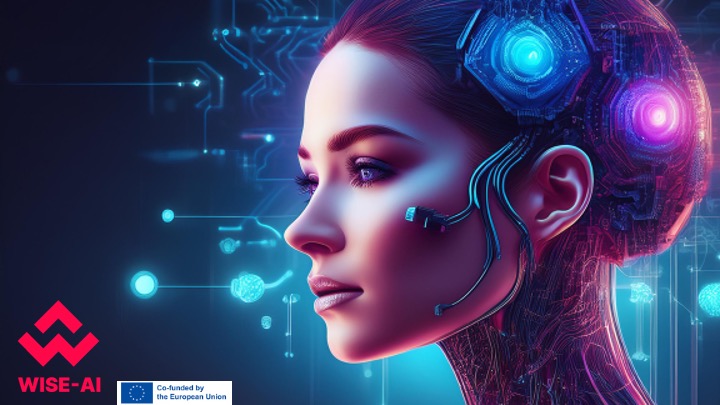WISE-AI is an Erasmus+ project focused on increasing young women’s employability in Artificial Intelligence (AI) in alignment with the SDGs. The project is led by Local Coordinator and BRU-Iscte researcher Aristides Ferreira and supported by BRU-Iscte research fellow Beatriz Saavedra.
AI is reshaping industries, economies, and everyday life. Yet, in this transformative field, women are still underrepresented. Despite making up 52% of the European population, only 18% of Europe’s ICT professionals women; furthermore, worldwide, the AI workforce comprises only 22% of women. Recognizing this disparity, the WISE-AI project has taken a step to address the imbalance and drive inclusivity in AI.
Identified barriers for women in AI
Key challenges for women’s participation in AI include:
- Cultural Stereotypes – from a young age, girls face societal pressures that discourage them from pursuing STEM careers. Many survey participants shared experiences of being told ‘tech’ is not for women, impacting their motivation and career choices.
- Educational Disparities – women are underrepresented in STEM education, with only 13% of female university graduates in Europe specializing in STEM fields, compared to 29% of men. Early exposure to AI concepts and coding remains limited, leaving many women feeling unprepared.
- Workplace Bias – emotions, unequal resource allocation, and limited access to career growth opportunities further hinder women’s progression in AI-related roles.
Building Confidence and Skills for the Future
Empowering women in AI demands a multifaceted approach:
- Early Education – incorporating AI and coding in school curricula can ignite interest and lay the groundwork for future expertise.
- Mentorship Programs – mentors play a pivotal role in inspiring young women and providing role models. Pairing women with successful AI professionals can enhance their confidence and career outlook.
- Gender-Sensitive Learning Environments – eliminating biases in teaching materials and creating supportive classrooms encourages women to thrive.
- Extracurricular Initiatives – hackathons, coding boot camps, and AI workshops provide practical, hands-on experience. Nearly a quarter (24.7%) of surveyed women expressed interest in AI tools but emphasized the need for formal learning opportunities.
- Accessible Resources – offering free, easy-to-understand AI learning platforms tailored to diverse skill levels can open doors for more women.
AI and the Sustainable Development Goals (SDGs)
AI’s potential to drive sustainable change cannot be overstated. The WISE-AI project highlights several key areas where AI aligns with SDGs:
- Gender Equality (SDG 5): AI can address biases in data, promoting fairness and inclusivity.
- Clean Water and Sanitation (SDG 6): AI-powered systems improve water resource management.
- Affordable and Clean Energy (SDG 7): smart grids optimize renewable energy consumption.
- Climate Action (SDG 13): AI enhances climate modeling and disaster preparedness.
- Global Partnerships (SDG 17): collaborative AI tools foster knowledge sharing and innovation for sustainability.
Key Insights and Opportunities
The project’s surveys and focus groups with young women across Europe reveal a blend of challenges and opportunities:
- Awareness Gaps – many participants were unaware of how AI applies to their desired professions or societal issues. One participant noted, “I never realized AI could address climate change or education gaps.”
- Cultural and Societal Pressures – subtle societal discouragement remains pervasive. However, peer networks were highlighted as a source of motivation and confidence, with many participants valuing collaborative learning environments.
- Positive Outlook on AI – over 60% of participants viewed AI as a tool for employability and societal improvement. This optimism underscores the importance of building engaging learning platforms and mentorship opportunities.
Practical Recommendations
To address the gender gap in AI, WISE-AI proposes the following actions:
- Gamified Learning – develop AI-based games linked to SDGs, making technical skills engaging and accessible.
- Mentorship Opportunities – establish mentorship programs that connect young women with accomplished female AI leaders.
- Collaborative Learning Tools – promote group-based learning and problem-solving approaches.
- Policy Changes – advocate for gender-sensitive policies in educational institutions and workplaces.
- Awareness Campaigns – share success stories of women in AI to inspire and encourage wider participation.
The WISE-AI initiative highlights the urgent need to include more women in AI to drive innovation and tackle global challenges. By fostering skills, confidence, and opportunities, this project lays the groundwork for a more inclusive and equitable AI workforce. It’s a vital step towards achieving not only gender equality but also broader sustainable development goals.
Empowering women in AI isn’t just an opportunity—it’s a necessity for a sustainable, innovative, and inclusive future. Let’s break the barriers, challenge stereotypes, and build a world where everyone has a voice in shaping the future of AI.
More information about the project: https://wise-ai.erasmusplus.website/

